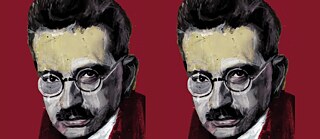|
6:00 PM
In These Trying Times: A Conversation on Walter Benjamin and History
Workshop|A panel discussion and workshop with the Brooklyn Institute for Social Research
-
Goethe-Institut Chicago Building (Michigan Room, 3rd. Fl.), Chicago, IL
- Language English

Please join us for an exploration of Walter Benjamin’s landmark essay “Theses on the Philosophy of History” and its impacts on and consequences for contemporary politics, philosophy, and historiography. The event will begin with opening remarks by Brooklyn Institute of Social Research (BISR) faculty Audrey Nicolaïdes and guests Annie Bourneuf and Peter Fenves, after which the audience and speakers will break into reading groups to grapple with the text directly. A panel discussion will conclude the event, with a wine reception to follow.
The last known work by Walter Benjamin, and among his most consequential, “Theses on the Philosophy of History” almost didn’t survive. Benjamin, attempting to flee Nazi-occupied France, entrusted a handful of pages to his friend, Hannah Arendt, shortly before his death in 1940. The 18 brief but dense paragraphs comprising the theses represent the most refined arguments for Benjamin’s methodology regarding history, time, and progress—and, simultaneously, some of his most cutting political commentary and convictions. The concept of history they articulate challenges the progressive notion of history unfolding in the “homogenous, empty time” that undergirds both capitalist modernity and “vulgar Marxism”—vulgar for its desire “to perceive only the progression of the exploitation of nature, not the regression of society.”
Rather, thinking with and through Paul Klee’s famous painting Angelus Novus, Benjamin sees history not as a “chain of events,” but as “one single catastrophe, which keeps piling wreckage upon wreckage.” His critique of historical progress, shared and developed by his Frankfurt School peers, resonates still for anyone conceptualizing and practicing politics in a present marked by ecological, economic, social, and political crisis. What motivates Benjamin’s radical re-imagining of history? What were the social and political developments in his lifetime that shaped his arguments? And to what extent can his arguments help us to shape responses to developments in our own present?
The event, which is free and open to the public, is taking place in conjunction with the Brooklyn Institute of Social Research's upcoming April course 'The Weimar Republic: Politics, Culture, and Catastrophe,' which will take place both online and, in a separate section, in-person at Goethe-Institut Chicago.
Please bring a photo ID for check-in, and note that this event will take place in the Michigan Room, on the 3rd Floor of 150 N. Michigan Ave., in the same building as the Goethe-Institut Chicago.
Rather, thinking with and through Paul Klee’s famous painting Angelus Novus, Benjamin sees history not as a “chain of events,” but as “one single catastrophe, which keeps piling wreckage upon wreckage.” His critique of historical progress, shared and developed by his Frankfurt School peers, resonates still for anyone conceptualizing and practicing politics in a present marked by ecological, economic, social, and political crisis. What motivates Benjamin’s radical re-imagining of history? What were the social and political developments in his lifetime that shaped his arguments? And to what extent can his arguments help us to shape responses to developments in our own present?
The event, which is free and open to the public, is taking place in conjunction with the Brooklyn Institute of Social Research's upcoming April course 'The Weimar Republic: Politics, Culture, and Catastrophe,' which will take place both online and, in a separate section, in-person at Goethe-Institut Chicago.
Please bring a photo ID for check-in, and note that this event will take place in the Michigan Room, on the 3rd Floor of 150 N. Michigan Ave., in the same building as the Goethe-Institut Chicago.
Location
Goethe-Institut Chicago Building (Michigan Room, 3rd. Fl.)
150 N Michigan Ave.
Chicago, IL 60601
USA
150 N Michigan Ave.
Chicago, IL 60601
USA